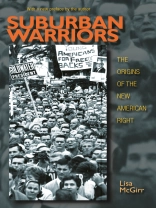In the early 1960s, American conservatives seemed to have fallen on hard times. Mc Carthyism was on the run, and movements on the political left were grabbing headlines. The media lampooned John Birchers’s accusations that Dwight Eisenhower was a communist puppet. Mainstream America snickered at warnings by California Congressman James B. Utt that ‘barefooted Africans’ were training in Georgia to help the United Nations take over the country. Yet, in Utt’s home district of Orange County, thousands of middle-class suburbanites proceeded to organize a powerful conservative movement that would land Ronald Reagan in the White House and redefine the spectrum of acceptable politics into the next century.
Suburban Warriors introduces us to these people: women hosting coffee klatches for Barry Goldwater in their tract houses; members of anticommunist reading groups organizing against sex education; pro-life Democrats gradually drawn into conservative circles; and new arrivals finding work in defense companies and a sense of community in Orange County’s mushrooming evangelical churches. We learn what motivated them and how they interpreted their political activity. Lisa Mc Girr shows that their movement was not one of marginal people suffering from status anxiety, but rather one formed by successful entrepreneurial types with modern lifestyles and bright futures. She describes how these suburban pioneers created new political and social philosophies anchored in a fusion of Christian fundamentalism, xenophobic nationalism, and western libertarianism.
While introducing these rank-and-file activists, Mc Girr chronicles Orange County’s rise from ‘nut country’ to political vanguard. Through this history, she traces the evolution of the New Right from a virulent anticommunist, anti-establishment fringe to a broad national movement nourished by evangelical Protestantism. Her original contribution to the social history of politics broadens—and often upsets—our understanding of the deep and tenacious roots of popular conservatism in America.
Sobre el autor
Lisa Mc Girr is professor of history at Harvard University.










